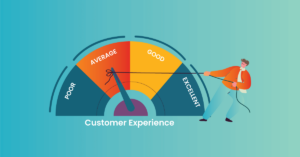As businesses adapt to a rapidly evolving digital landscape, customer experiences (CX) are undergoing a significant transformation. With consumers increasingly relying on digital channels, companies must rethink how they engage with their audience.
By 2025, businesses that fail to prioritize a seamless and personalized digital-first experience will struggle to remain competitive. In this article, we explore how customer expectations are shifting in a digital-first world and offer strategies to redefine your customer experience for success.

The Rise Of The Digital-First Customer
Within the past 10 years, Customers are more digitally engaged than ever before. The digital-first customer expects convenience, speed, and personalization at every touchpoint. Whether they’re shopping online, browsing social media, or using mobile apps, customers want instant gratification and seamless interactions.
According to recent statistics, nearly 80% of customers now prefer digital experiences over traditional in-person interactions. This shift has led to increased demand for businesses to optimize their digital platforms, ensuring that customers can access services, make purchases, and interact with brands with ease. Companies that embrace this change and cater to the digital-first customer will have a competitive edge in the coming years.
To meet these demands, businesses must focus on creating user-friendly, fast, and personalized digital experiences. From website design to mobile app functionality, every element should be optimized for the best possible customer journey.
Personalization In The Digital-First Era
Personalization has become a key driver of memorable customer experiences, especially in the digital space. Customers expect brands to understand their preferences and deliver relevant content, products, and services based on their unique behaviors and needs. This level of personalization is made possible through the effective use of data and AI technology.
With the help of advanced data analytics and artificial intelligence, businesses can gather insights into customer preferences, behaviors, and purchase patterns. This information allows companies to tailor their offerings, making the customer feel valued and understood.
To stay ahead in 2025, companies should invest in AI-driven personalization tools that allow them to create meaningful interactions with their customers at every digital touchpoint and build long-term loyalty.
Seamless Omnichannel Customer Experiences
Customers expect to interact with brands across multiple channels like websites, mobile apps, social media, and, in some cases, physical stores. However, they also expect these interactions to be consistent and seamless, regardless of the platform. This is where omnichannel customer experiences come into play.
Omnichannel strategies involve integrating multiple customer touchpoints into a unified experience, allowing customers to move fluidly between platforms without disruption. For example, a customer might start researching a product on your website, add it to their cart on your mobile app, and complete the purchase in-store, all without losing their progress.
Achieving this level of seamless integration requires strong backend systems, including CRM software that tracks customer data across channels. By centralizing customer information, businesses can ensure that every interaction, whether online or offline, is consistent and personalized. The goal is to create a frictionless customer journey where each touchpoint enhances the overall experience rather than complicating it.

Leveraging AI And Automation To Enhance Customer Experiences
Artificial intelligence (AI) and automation are reshaping the way businesses interact with their customers. From chatbots and virtual assistants to automated email marketing and customer support systems, these technologies allow companies to provide faster, more efficient service without sacrificing the personal touch.
AI-driven chatbots, for instance, can handle customer inquiries 24/7, offering quick responses to common questions and helping customers find the information they need. By automating routine tasks, businesses can free up their customer service teams to focus on more complex issues that require human intervention. This not only improves efficiency but also enhances the customer experience by providing faster service.
Automation can also be used to streamline the customer journey. For example, e-commerce businesses can set up automated workflows that trigger personalized emails based on customer behavior, such as abandoned cart reminders or post-purchase follow-ups. These automated interactions keep customers engaged while offering personalized touchpoints that build loyalty.
As AI and automation continue to evolve, businesses that leverage these technologies effectively will be well-positioned to offer superior customer experiences in 2025 and beyond.
The Impact Of Real-Time Data And Analytics
Real-time data is a game-changer for businesses looking to optimize their customer experiences. By analyzing customer behavior in real time, companies can gain valuable insights into how customers interact with their digital platforms. This data allows businesses to respond quickly to customer needs, make informed decisions, and adjust their strategies on the fly.
For example, e-commerce platforms can use real-time data to track customer browsing habits and offer relevant product recommendations in real time. Similarly, businesses can monitor website traffic and engagement metrics to identify potential pain points in the customer journey, allowing them to make immediate improvements.
Data analytics also play a crucial role in understanding customer preferences and predicting future behavior. By analyzing past interactions, businesses can anticipate customer needs and deliver personalized experiences that keep customers coming back.
In 2025 and beyond, businesses that harness the power of real-time data and analytics will be able to offer more dynamic and responsive customer experiences, staying ahead of competitors in the process.
Ensuring Security And Privacy In A Digital-First World
As customer interactions move increasingly online, ensuring the security and privacy of customer data has become paramount. In a digital-first world, customers are highly concerned about how their personal information is being used and protected. Businesses that fail to prioritize data security risk losing customer trust and facing legal consequences.
To build trust with customers, businesses must implement robust security measures, including encryption, secure payment gateways, and compliance with data protection regulations such as GDPR. Clear communication about how customer data is collected, used, and stored is also essential to maintaining transparency and trust.
By prioritizing security and privacy, businesses can protect their customers while fostering a sense of trust that enhances the overall customer experience.

Conclusion
The future of customer experiences is undoubtedly digital, and businesses must adapt to stay competitive. To prepare for 2025, companies should focus on adopting advanced technologies, embracing personalization, and delivering seamless omnichannel experiences.
AI, automation, and real-time data will play critical roles in enhancing the customer experience, while ensuring security and privacy will be essential for maintaining customer trust. By continuously evolving and staying agile, businesses can not only meet the expectations of the digital-first customer but exceed them. The key is to be proactive, adaptable, and committed to delivering exceptional experiences at every touchpoint.
Ready to redefine your customer experiences for the digital-first world of 2025? At Senrab ConsulTech, we specialize in providing cutting-edge solutions that help businesses create seamless, personalized, and secure digital experiences. Contact us today to learn how we can help you stay ahead of the curve and delight your customers!


